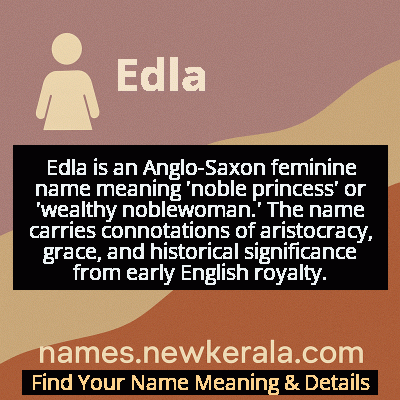Edla Name Meaning & Details
Origin, Popularity, Numerology Analysis & Name Meaning of Edla
Discover the origin, meaning, and cultural significance of the name EDLA. Delve into its historical roots and explore the lasting impact it has had on communities and traditions.
Name
Edla
Gender
Female
Origin
Anglo
Lucky Number
4
Meaning of the Name - Edla
Edla is an Anglo-Saxon feminine name meaning 'noble princess' or 'wealthy noblewoman.' The name carries connotations of aristocracy, grace, and historical significance from early English royalty.
Edla - Complete Numerology Analysis
Your Numerology Number
Based on Pythagorean Numerology System
Ruling Planet
Uranus (Rahu)
Positive Nature
Strong sense of order, loyal, practical, and disciplined.
Negative Traits
Stubborn, overly serious, rigid, and prone to feeling restricted.
Lucky Colours
Blue, gray.
Lucky Days
Saturday.
Lucky Stones
Blue sapphire.
Harmony Numbers
1, 7, 8.
Best Suited Professions
Managers, engineers, accountants, organizers.
What People Like About You
Dependability, discipline, practicality.
Famous People Named Edla
Edla of England
Anglo-Saxon Princess
Royal lineage and diplomatic significance in early English history
Edla Muir
Scottish Poet
Significant contributions to 19th century Scottish literature
Edla van der Heyden
Art Historian
Groundbreaking research in medieval Anglo-Saxon art history
Name Variations & International Equivalents
Click on blue names to explore their detailed meanings. Gray names with will be available soon.
Cultural & Historical Significance
In broader cultural context, Edla represents the preservation of Anglo-Saxon linguistic and cultural elements that survived the Norman French influence following 1066. The name's evolution and occasional revival reflect ongoing interest in England's deep historical roots and the romantic appeal of its ancient aristocracy. Culturally, Edla serves as a reminder of the sophisticated society that existed in England before the Norman arrival, with its own traditions of governance, art, and social structure. The name's continued, though selective, usage in modern times speaks to the enduring power of historical identity and the human desire to maintain connections with ancestral heritage through the meaningful choice of personal names.
Extended Personality Analysis
Individuals named Edla are typically characterized by a blend of traditional values and independent thinking that reflects the name's historical depth. They often possess a quiet confidence and natural authority that doesn't need to assert itself aggressively, instead earning respect through consistent demonstration of wisdom and integrity. Edlas tend to be deeply principled people who value honesty, loyalty, and tradition, yet they approach life with a practical intelligence that allows them to adapt these principles to modern circumstances. Their personality often includes a strong sense of responsibility toward family, community, and cultural heritage, combined with the emotional intelligence to understand and navigate complex social dynamics.
In interpersonal relationships, Edlas are known for their reliability and thoughtful nature. They make excellent friends and partners because they combine emotional stability with genuine caring and the ability to offer wise counsel. Their historical name often gives them a sense of connection to something larger than themselves, which can manifest as interest in history, genealogy, or cultural preservation. At the same time, modern Edlas typically balance this traditional orientation with contemporary values of equality, education, and personal growth. They often excel in roles that require diplomacy, cultural sensitivity, and the ability to bridge different perspectives or generations, making them valuable contributors to their communities and professions.
Modern Usage & Popularity
In contemporary naming practices, Edla occupies a unique position as a historical name that has never become overly common, maintaining its distinctive character while appealing to modern parents seeking meaningful, heritage-rich names. The name has seen a slight increase in usage in recent decades, particularly in England and among diaspora communities with strong connections to English history and culture. This revival aligns with broader trends favoring vintage names and those with significant historical or literary associations. Modern usage often involves parents who are specifically interested in Anglo-Saxon history or who appreciate the name's elegant simplicity and royal connotations. While Edla remains outside the top name rankings, its selective use ensures that it retains its special character and avoids the dilution that sometimes affects more popular historical names. The name's current appeal lies in its combination of historical depth, feminine grace, and distinctive sound that sets it apart from more common choices while remaining accessible and pronounceable.
Symbolic & Spiritual Meanings
Symbolically, Edla represents the enduring quality of cultural heritage and the graceful integration of tradition into modern life. The name embodies the concept of 'noble inheritance' not in the material sense, but as the preservation of values, wisdom, and identity across generations. Metaphorically, Edla suggests a person who carries the strength of their ancestry while navigating contemporary challenges with dignity and purpose. The name symbolizes the idea that true nobility comes from character rather than birth, and that historical connections can provide grounding and perspective in an rapidly changing world. In a broader sense, Edla represents cultural continuity—the thread that connects past, present, and future through the meaningful transmission of names, stories, and values that define personal and collective identity.

